“Falsehood flies, and truth comes limping after it,” said the celebrated satirist Jonathan Swift.
A rising tide of fake news and disinformation is dominating World Press Freedom Day discussions taking place this week in Ethiopia, which is hosting the event after freeing jailed journalists as part of sweeping reforms, AP reports:
As the world prepares to mark the day on Friday, media practitioners and experts have raised the alarm and deliberated on ways to combat disinformation that they say is becoming a “threat to democracy.”
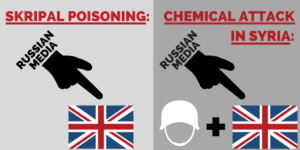
EU Stratcom Task Force
Russia used “weapons of disinformation” to spread the Kremlin’s version of events about the Salisbury nerve agent attack last year, said UK Foreign Secretary Jeremy Hunt, PA reports:
He used a speech in Addis Ababa, Ethiopia, to take aim at the likes of RT – formerly Russia Today – over its broadcasting of the Russian state’s “official narrative” of the poisoning of Sergei Skripal and his daughter Yulia. In an address to mark World Press Freedom Day, Mr Hunt championed the benefits of media freedom and warned that the authoritarian model of development is “ultimately flawed”.
“After the Russian state carried out a chemical attack in the British city of Salisbury last year, the Kremlin came up with over 40 separate narratives to explain that incident,” he said.
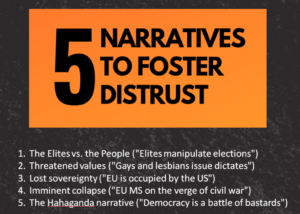
EU vs Disinfo
Narratives are more important than purely accurate or truthful information when it comes to countering fake news, Russian dissident Mikhail Khodorkovsky said today.
Russian citizens have access to the “full gamut of information,” but a large majority believed the Kremlin’s fallacious explanation of the downing of Malaysia Airlines Flight 17 on July 17, 2014, over war-
 “But if we don’t do propaganda we can’t shift Putin,” said Khodorkovsky, who joined with his former business partner Leonid Nevzlin to establish Justice for Journalists, a foundation designed to investigate crimes against journalists. The group was founded after three Russian journalists, Kiril Radchenko, Alexander Rastorguev and Orkhan Dzhemal were murdered in the Central African Republic while investigating Wagner, a private Russian mercenary group linked to Evgeny Prigozhin, a close associate of Russian President Vladimir Putin and the head of the infamous Troll Factory, it adds.
“But if we don’t do propaganda we can’t shift Putin,” said Khodorkovsky, who joined with his former business partner Leonid Nevzlin to establish Justice for Journalists, a foundation designed to investigate crimes against journalists. The group was founded after three Russian journalists, Kiril Radchenko, Alexander Rastorguev and Orkhan Dzhemal were murdered in the Central African Republic while investigating Wagner, a private Russian mercenary group linked to Evgeny Prigozhin, a close associate of Russian President Vladimir Putin and the head of the infamous Troll Factory, it adds.
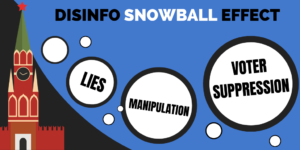
EU vs Disinfo
Russia’s disinformation campaign against the EU – and by extension, its electoral process – has been underway for five years, notes EU vs Disinfo. The Kremlin’s efforts to undermine public support for the EU, promote populist and Eurosceptic parties and candidates, increase polarisation and fragment European unity began in earnest in 2014, and have not relented since (HT: StopFake.org).
Radio Free Asia’s President noted the serious challenges and threats the organization and its contributors face. “Radio Free Asia’s brave reporters often endure unimaginable threats and intimidation so we can get the truth to our audiences,” said RFA President Libby Liu. “Regimes resort to every possible means to crush independent voices with impunity. The consequences have sadly been profound for RFA’s journalists.
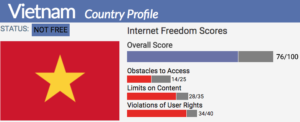 “Among the dozens of bloggers and reporters imprisoned under Vietnam’s restrictive media laws are RFA videographer Nguyen Van Hoa, and more recently, blogger Truong Duy Nhat who resurfaced in a Vietnamese prison three months after disappearing from Bangkok where he was seeking asylum,” she added.
“Among the dozens of bloggers and reporters imprisoned under Vietnam’s restrictive media laws are RFA videographer Nguyen Van Hoa, and more recently, blogger Truong Duy Nhat who resurfaced in a Vietnamese prison three months after disappearing from Bangkok where he was seeking asylum,” she added.
“China continues to hold dozens of relatives of six U.S.-based Uyghur journalists in retaliation for their work exposing the mass incarcerations in Xinjiang. In Cambodia, two former RFA reporters continue to face trumped-up charges for their past association with our organization, long after we were forced to leave the country,” said Liu.
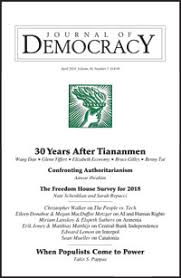 Threats to media freedom feature in Nate Schenkkan and Sarah Repucci’s report on Freedom House’s annual Freedom in the World survey for 2018, in in the April 2019 issue of the National Endowment for Democracy’s Journal of Democracy.
Threats to media freedom feature in Nate Schenkkan and Sarah Repucci’s report on Freedom House’s annual Freedom in the World survey for 2018, in in the April 2019 issue of the National Endowment for Democracy’s Journal of Democracy.
Reporters Without Borders (RSF)’s recent World Press Freedom Index emphasized the news “black hole” developing in China and Vietnam where authoritarian rulers continue to consolidate their power.
RFE/RL correspondent Saniya Toiken was held for questioning by police in Kazakhstan’s newly named capital city Nur-Sultan after she sought information at the police station about dozens of persons who were detained at May 1 protests ….Yesterday’s detention was the fourth this year for Toiken, a recipient of the International Women’s Media Foundation’s 2017 Courage in Journalism Award. She has been harassed repeatedly by authorities in connection with her reporting of labor protests in the western Kazakh city of Zhanaozen.
For reporters in other countries, the situation is even more prohibitive, RFE/RL adds:
- In Afghanistan, where RFE/RL lost three of its colleagues one year ago in a suicide bomb attack in Kabul targeting journalists, its reporters continue to work despite conditions of routine violence, while fearing that a proposed power-sharing deal with the Taliban could reverse the hard-fought, but fragile, media pluralism the country has attained.
- In neighboring Pakistan, RFE/RL’s Islamabad bureau remains closed, 15 months after the country’s Inter-Service Intelligence (ISI) agency accused it of airing programs “against the interest of Pakistan.” The Pashto-language service has since reorganized, and continues to provide record audiences with a powerful alternative to extremist propaganda.
- In Ukraine, where RFE/RL’s Ukrainian Service recently earned millions of views for its standout coverage of the country’s presidential election, investigative journalists face increasing surveillance and harassment by government officials and oligarchs. At the same time, Russia-backed authorities have taken steps to sideline and silence RFE/RL contributors in forcibly annexed Crimea. In eastern Ukraine, blogger Stanislav Aseyev has been held incommunicado for nearly two years after being detained by Russia-backed separatists in Donetsk.
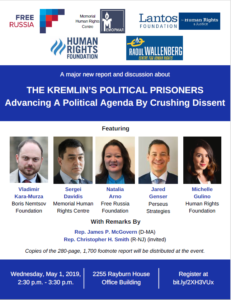 A criminal investigation against RFE/RL Russian Service contributor Svetlana Prokopyeva in connection with a radio commentary she gave about a suicide bombing last year corroborates a new report, titled The Kremlin’s Political Prisoners: Advancing A Political Agenda By Crushing Dissent, which documents Russia’s use of an “ever-increasing array of laws” to intimidate critics and criminalize free speech. Russia’s proposal to adopt a Chinese-like Internet model has raised concerns that such a “sovereign Internet” would bolster the country’s penal structure by enabling authorities to censor opinion and information online.
A criminal investigation against RFE/RL Russian Service contributor Svetlana Prokopyeva in connection with a radio commentary she gave about a suicide bombing last year corroborates a new report, titled The Kremlin’s Political Prisoners: Advancing A Political Agenda By Crushing Dissent, which documents Russia’s use of an “ever-increasing array of laws” to intimidate critics and criminalize free speech. Russia’s proposal to adopt a Chinese-like Internet model has raised concerns that such a “sovereign Internet” would bolster the country’s penal structure by enabling authorities to censor opinion and information online.- In one of the day’s most quoted reports on press freedom, Reporters Without Borders relegated Turkmenistan, always ranked among the world’s most restrictive countries, to last place, behind even North Korea. RFE/RL has reported from Turkmenistan since 1953. In 2018, the UN held the Turkmen government responsible for the 2006 death in custody of RFE/RL contributor Ogulsapar Muradova.
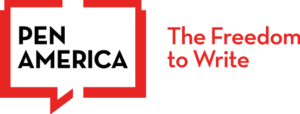 PEN America joined forces with its membership of prominent writers and journalists alongside civic leaders, advocates, and lawmakers to underline the urgency of active defense of press freedom. Supporters of press freedom can find out more and take action at https://pen.org/free-press-2019
PEN America joined forces with its membership of prominent writers and journalists alongside civic leaders, advocates, and lawmakers to underline the urgency of active defense of press freedom. Supporters of press freedom can find out more and take action at https://pen.org/free-press-2019
 To mark World Press Freedom Day, a round-table discussion will consider the topic of Freedom of the Press in Azerbaijan, the Institute for Reporters’ Freedom and Safety reports.
To mark World Press Freedom Day, a round-table discussion will consider the topic of Freedom of the Press in Azerbaijan, the Institute for Reporters’ Freedom and Safety reports.
The event will address issues such as: the security and the persecution of journalists, the problems with access to information, Internet censorship, defamation, the objectivity and independence of the media, the economic condition of the media, public broadcasting, journalistic ethics, the activity of the media during election periods and a number of other current problems of the Azerbaijani media space. Leading media experts and representatives of the journalistic community of Azerbaijan are expected to speak at the event.
The round-table discussion will be held Friday, May 3 from 11:00 to 13:00 at the Hilton Hotel (YAGUT hall), Azadliq 1B Avenue, Baku, Azerbaijan.







